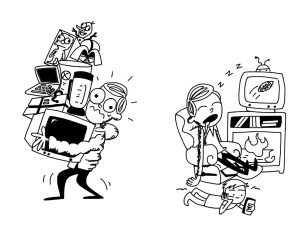Black Friday is dangerous consumerism
November 15, 2018
Black Friday, the day after Thanksgiving, has long been associated with a number of different ideas in the public. It serves as the busiest shopping day of the year, despite some declining turnout numbers in the last year. But while it does play a strong commercial purpose, the pseudo-holiday also is responsible for inciting violence and exploiting workers.
It’s no secret that Black Friday shopping is a dangerous gamble. Riots, stampedes, and fights are all common occurrences that day. According to Black Friday Death Count, a website that provides a count of confirmed deaths and injuries on the holiday, there have been 10 deaths and 111 injuries since 2006. But the more hidden danger is not in stores but rather in the rampant consumerism that leads to the exploitation of industry workers.
The National Retail Federation put the sales total for last year’s Black Friday at $690 billion. With the excess of spending, it is difficult to know whether you’re buying ethically or not. Fast fashion and similar industries produce dangerous repercussions for both people and the environment: Factories underpay and mistreat their workers as they put out incredibly harmful toxins into the environment. Even online shopping has its dangers. For example, Amazon, one of the most popular places for online shopping, has a history of putting its workers in awful conditions in order to maintain its business model.
Workers around the world are put in dangerous conditions in order to turn out an $8 T-shirt or new technologies and products. Because of this, Black Friday is an outmoded consumerist “holiday” that should no longer exist in the modern world.





